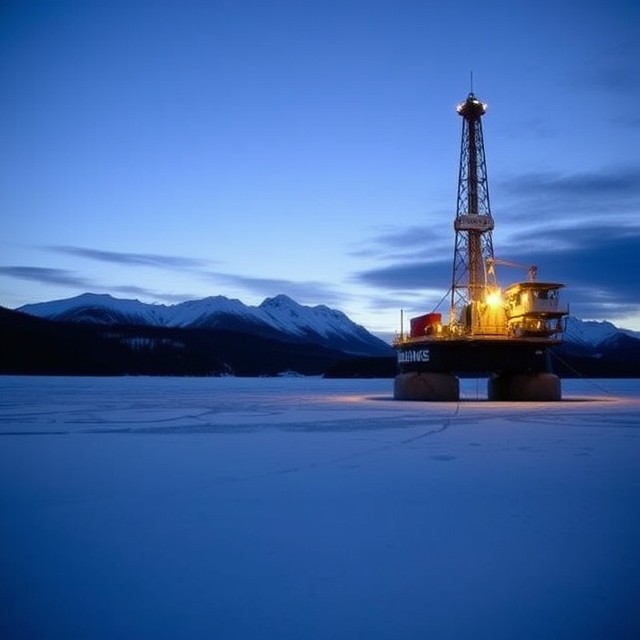The legal battle between Alaska and the U.S. government revolves around the cancellation of oil leases in the Arctic. This dispute is significant due to its impact on the state’s economy, energy policies, and environmental concerns.
Key Issue: What Led to the Lawsuit and Why It’s a High-Stakes Situation
The lawsuit was triggered when the Biden administration decided to cancel multiple oil and gas leases in the Arctic National Wildlife Refuge (ANWR), citing environmental protection concerns. This move was part of a broader effort to reduce fossil fuel reliance and combat climate change. Alaska, heavily dependent on oil revenue, views this as a threat to its economy and jobs. The stakes are high because the outcome could influence future energy policies, the development of natural resources, and the balance between economic interests and environmental preservation.
What Are Oil Leases in the Arctic?
Oil leases in the Arctic are agreements that allow companies to explore and extract oil and natural gas from specific areas in the Arctic. The U.S. government grants these leases, giving private companies the rights to drill and develop the land for energy production, usually in offshore areas or regions like the Arctic National Wildlife Refuge (ANWR).
The Importance of These Leases for Alaska’s Economy, Oil Industry, and Jobs
For Alaska, these leases are vital to its economy. The state depends on oil revenues to fund public services and support jobs. The oil industry plays a major role, providing thousands of jobs in areas such as drilling, transport, and refining. Oil leases also contribute to the Alaska Permanent Fund, which gives dividends to state residents.
Overview of Previous Agreements and Expectations from These Leases
In the past, under the Trump administration, the government approved oil drilling in ANWR, expecting it to boost economic growth and reduce dependence on foreign oil. Alaska had high hopes for these leases, believing they would create jobs and increase revenue. However, the Biden administration has cancelled some of these leases, putting Alaska’s expectations for future oil development at risk.
Why Did the U.S. Government Stop the Leases?
The U.S. government decided to halt certain oil leases in the Arctic due to a combination of environmental concerns and a broader shift towards green energy policies.
Government’s Rationale Behind Halting the Leases
The main reason for stopping the leases is to protect the environment. The Biden administration argues that continued oil drilling in the Arctic could lead to irreversible environmental damage, particularly in sensitive regions like the Arctic National Wildlife Refuge (ANWR). The U.S. government believes that focusing on oil extraction in these areas conflicts with long-term environmental protection goals.
Environmental Concerns, Climate Change, and Potential Harm to Wildlife in the Arctic
A key issue is the potential harm to wildlife in the Arctic. The region is home to endangered species, like the polar bear and caribou, and the risk of oil spills or disruption from drilling operations could damage their habitats. Additionally, climate change is already having a significant impact on the Arctic, with rising temperatures affecting ecosystems. The government is concerned that oil development would contribute to further climate damage.
The Biden Administration’s Shift Towards Green Energy
The Biden administration has made it a priority to move towards clean energy solutions and reduce the country’s reliance on fossil fuels. As part of this green energy transition, halting oil leases in the Arctic is seen as a step toward reducing carbon emissions and promoting sustainability. This shift aligns with broader global goals to fight climate change and transition to more renewable energy sources.
Alaska’s Response: The Lawsuit Explained
The state of Alaska filed a lawsuit against the U.S. government after the cancellation of oil leases in the Arctic, claiming that the decision harms the state’s economic interests and violates its rights.
Details of the Lawsuit Filed by the State of Alaska
Alaska’s lawsuit challenges the Biden administration’s decision to halt several oil leases in the Arctic, particularly in areas like the Arctic National Wildlife Refuge (ANWR). The state argues that the cancellation of these leases violates federal agreements and disrupts previous commitments made under earlier administrations. Alaska contends that the federal government failed to follow proper legal processes when deciding to cancel the leases.
Key Arguments Made by Alaska’s Leaders to Protect Their Economic Interests
Alaska’s leaders argue that oil revenues are crucial to the state’s economy. They emphasize that the oil industry supports thousands of jobs and generates income for important state programs. Leaders also claim that the cancellation will negatively impact the Alaska Permanent Fund, which provides dividends to residents. The state views the decision as an attack on its economic stability and self-reliance, which are deeply tied to energy development.
How the State Argues the Decision Undermines Its Rights and Sovereignty
The state argues that the federal government’s action undermines Alaska’s sovereignty by overriding decisions made at the state level regarding its resources. Alaska believes that it has the right to manage its own natural resources, including oil and gas, and that the federal government is overstepping its authority by blocking these leases. The lawsuit highlights how Alaska had already committed to environmental protections while pursuing responsible energy development, making the decision unfair and harmful to its people.
The Economic Impact of Stopping Arctic Oil Leases
The decision to halt Arctic oil leases has significant economic consequences for Alaska and beyond, affecting both local communities and the broader U.S. energy sector.
How Stopping the Leases Affects Local Communities in Alaska
Local communities in Alaska are heavily dependent on the oil industry for their economic survival. Oil revenues help fund public services, infrastructure, and programs for residents. With the leases stopped, communities could face financial instability, especially in remote areas where oil is a major employer. The loss of future oil exploration means that towns might experience declining tax revenue and higher costs for maintaining basic services.
Potential Job Losses and Negative Impacts on Businesses Reliant on Oil Production
Stopping the oil leases could lead to job losses across various sectors related to oil production. Thousands of workers in drilling, transport, and refining may face unemployment or reduced hours. Local businesses that rely on the oil industry, such as construction companies, transportation firms, and service providers, may also suffer from decreased demand for their services. This could cause a ripple effect through the economy, resulting in reduced incomes and business closures.
The Broader Economic Consequences for the U.S. Energy Sector and Global Oil Markets
The halt in Arctic oil exploration can have a larger impact on the U.S. energy sector. The U.S. could lose the opportunity to tap into valuable energy resources that could reduce its dependence on foreign oil and increase energy security. On a global scale, this decision could affect oil supply and prices, particularly if other countries, such as Russia, continue to develop their Arctic resources. Additionally, the disruption in U.S. oil production may lead to higher energy costs, affecting consumers and businesses nationwide. The global oil market could experience volatility if the U.S. reduces its production capacity while demand for oil continues to rise.
Environmental Debate: A Battle Between Economy and Nature
The debate over drilling in the Arctic pits economic growth against environmental protection. Both sides of the argument have strong positions on what’s at stake for the future of Alaska, the U.S. economy, and the planet.
The Impact of Drilling in the Arctic on Wildlife, Ecosystems, and Climate Change
Drilling in the Arctic has a direct impact on the region’s wildlife and ecosystems. The Arctic is home to endangered species, including polar bears, caribou, and various migratory birds. Oil exploration could disrupt their habitats, harm animal populations, and increase the risk of oil spills, which can have long-lasting damage to marine life and coastal ecosystems.
Additionally, drilling in such a sensitive area contributes to climate change. Extracting fossil fuels and burning oil leads to higher carbon emissions, exacerbating global warming and causing more extreme weather patterns, rising sea levels, and loss of biodiversity worldwide. The Arctic itself is warming faster than the rest of the planet, and further oil development would only accelerate these harmful effects.
Why Some See This Decision as Crucial for a Sustainable Future
Those who support halting Arctic drilling argue that protecting the environment is essential for a sustainable future. By leaving the Arctic untouched, the U.S. could take an important step in combating climate change and preserving ecosystems for future generations. They believe that moving away from fossil fuel dependence and transitioning to green energy sources is the only way to avoid environmental disaster and ensure a livable planet.
Why Others View It as Harmful to Economic Development
On the other side of the debate, many see the halt in oil leases as detrimental to economic growth. For Alaska, the oil industry is a cornerstone of its economy, providing essential revenue, jobs, and funding for public services. Halting Arctic oil exploration is viewed as a threat to energy independence, which could increase reliance on foreign oil, raise energy prices, and harm local businesses that depend on the oil sector. Critics argue that economic development and environmental protection can go hand in hand, with responsible drilling techniques and sustainable practices ensuring both growth and conservation.
The Legal Process: What Happens Next?
The lawsuit filed by Alaska against the U.S. government over the cancellation of oil leases is just beginning, and several key steps remain in the legal proceedings.
What Steps Are Involved in the Legal Proceedings of the Lawsuit?
- Filing the Case: Alaska has already filed the lawsuit in a federal court, challenging the decision to cancel the oil leases.
- Discovery and Pre-Trial Motions: Both sides will gather evidence, submit documents, and make legal arguments. The court may also rule on pre-trial motions that could shape the scope of the case.
- Trial or Settlement: If the case goes to trial, both parties will present their arguments, and a judge will make a decision. Alternatively, a settlement could be reached without a trial, where both parties agree to a compromise.
- Judgment: The court will issue a final ruling on whether the federal government’s actions were legal and whether the oil leases can be reinstated or permanently blocked.
Potential Outcomes of the Case and How It Could Shape Future Energy Policy
The case could have significant consequences for both energy policy and federal-state relations. If Alaska wins, it could pave the way for more oil exploration in the Arctic, potentially reversing the shift toward greener energy. A ruling in favor of the federal government would strengthen the move toward environmental protection and may set a precedent for more stringent climate-related policies in the future. This case could influence how the U.S. balances economic growth and environmental goals moving forward.
Possible Appeals and How the Decision Could Affect Future Federal-State Relations Over Energy
Regardless of the initial ruling, the case could go through appeals, especially if one side believes the decision was unjust. If the appeals court upholds the lower court’s decision, it will likely lead to the permanent cancellation of the leases. If overturned, it could reopen opportunities for energy exploration in the Arctic. The outcome of this case could have broader implications for federal-state relations over energy, particularly as states like Alaska seek more control over their natural resources while the federal government continues to push for climate policies and green energy solutions. The case will likely influence future negotiations between state governments and the federal government regarding energy development, resource management, and environmental protection.
Global Implications: The Arctic Oil Fight on the World Stage
The lawsuit between Alaska and the U.S. government over Arctic oil leases has the potential to impact not only U.S. policy but also global energy dynamics and international relations concerning the Arctic.
How This Lawsuit Could Influence Other Global Energy Disputes
This lawsuit could serve as a precedent for other countries with energy disputes, especially in resource-rich regions like the Arctic. Nations like Russia, Canada, and Norway are involved in their own Arctic energy exploration. If the U.S. is successful in blocking oil development in the Arctic, other countries might face increasing pressure to halt or slow down their own drilling operations in environmentally sensitive regions. The case might also encourage more environmental activism in global energy sectors, pushing for tighter regulations on oil exploration, especially in vulnerable ecosystems.
The Impact on International Relations Regarding Arctic Resources
The Arctic is not only home to abundant oil and gas reserves, but it is also a geopolitical hotspot. International relations between Arctic nations could be affected if legal battles like the one between Alaska and the U.S. government become more common. Countries might argue over the right to exploit Arctic resources, with environmental groups pushing for global protections while governments and corporations argue for economic benefits. The case could lead to new international agreements or disputes over how Arctic resources should be developed, potentially influencing the governance of the Arctic as a whole.
How Global Shifts Toward Renewable Energy Could Shape Future Energy Laws
As the world shifts toward renewable energy, this lawsuit could become part of a larger global transition away from fossil fuels. Governments around the world are increasingly adopting climate-friendly policies to reduce carbon emissions and invest in clean energy. The outcome of this case might strengthen green energy movements globally, leading to tougher environmental regulations and new laws that prioritize sustainability over oil extraction. If the U.S. legal system rules in favor of environmental protection, it could signal to other nations that prioritizing the environment in energy laws is not only desirable but necessary for the future.
Public Opinion: How Alaskans and the Rest of the U.S. Feel
The controversy surrounding oil leases in the Arctic has created a divide in public opinion between Alaskan residents and the rest of the U.S.. The debate touches on issues of economic growth, job security, and environmental protection, reflecting varying priorities in different regions.
The Divide Between Alaskan Residents and Other U.S. States Regarding the Oil Leases
Alaska’s residents generally support the development of oil resources in the Arctic due to the economic benefits it brings, including jobs and state revenue. Many Alaskans view oil drilling as essential for their economic survival and the continuation of their way of life. On the other hand, other U.S. states, particularly in the Northeast and West Coast, tend to focus more on environmental protection and climate change. These areas may view Arctic drilling as a dangerous step that could lead to environmental harm and increase the nation’s carbon footprint.
Polling Data and Public Opinion on the Balance Between Economic Growth and Environmental Protection
Polling data often shows that Americans are divided on the balance between economic growth and environmental protection. While many agree that the economy needs energy resources, there is a growing consensus that environmental conservation should not be sacrificed for immediate economic gains. According to various surveys, a majority of U.S. citizens express concerns about climate change and support policies that focus on sustainable energy solutions. However, there is also a significant portion of the population that believes economic stability—especially in states like Alaska—is closely tied to oil production.
What U.S. Citizens Think About Drilling in Sensitive Environments Like the Arctic
While many Americans recognize the importance of oil for energy independence, most express hesitation about drilling in sensitive environments like the Arctic. Public opinion tends to favor protecting unique ecosystems and wildlife from the risks associated with oil extraction, such as oil spills and long-term environmental degradation. A significant number of people are calling for alternative energy solutions to reduce the dependence on fossil fuels and avoid damaging pristine wilderness areas.
Conclusion: The Future of Alaska’s Oil Industry and U.S. Energy Policy
Recap of the Stakes in the Lawsuit and Its Potential Outcomes
The lawsuit between Alaska and the U.S. government represents a significant legal and economic battle. The outcome could have long-term consequences for Alaska’s oil industry, future energy policy, and the nation’s environmental agenda. The state argues that the cancellation of Arctic oil leases threatens its economy and job market, while the federal government seeks to preserve the environment and fight climate change.
What It Means for Alaska’s Oil Industry and the U.S. Government’s Future Approach to Energy Policy
If Alaska loses the case, the oil industry in the state could face major setbacks, with reduced opportunities for new exploration and revenue generation. This would push the state to rely more on federal support or explore other industries for economic growth. For the U.S. government, a decision to block oil drilling in the Arctic would reinforce its commitment to green energy policies, possibly accelerating the country’s transition toward renewable sources like solar and wind power.
Final Thoughts on How This Case Could Shape Future Energy Decisions Across the Globe
The decision in this case could set a global precedent for how nations handle the balance between economic development and environmental conservation in sensitive regions. If the U.S. blocks Arctic drilling, it may influence other countries with oil reserves in fragile ecosystems, such as the Amazon rainforest or offshore islands. This case could ultimately push the world towards more sustainable energy practices, encouraging governments to adopt climate-friendly policies that prioritize long-term environmental health over short-term economic gains.









